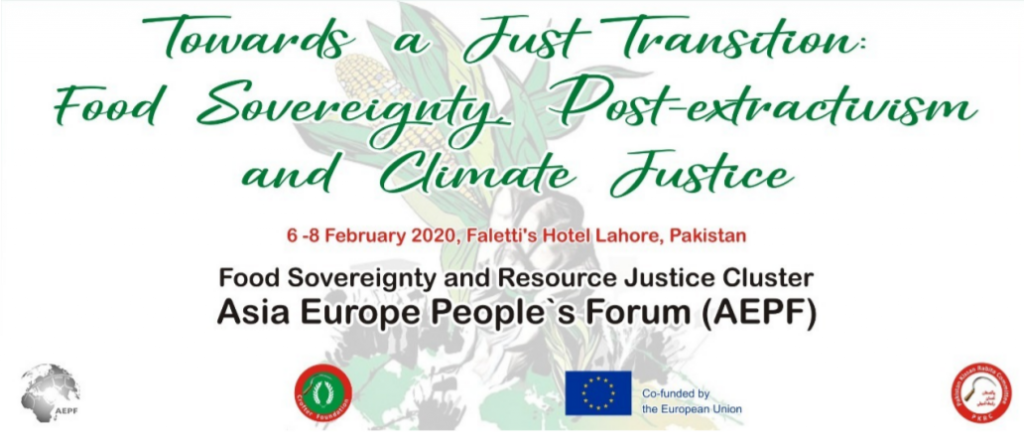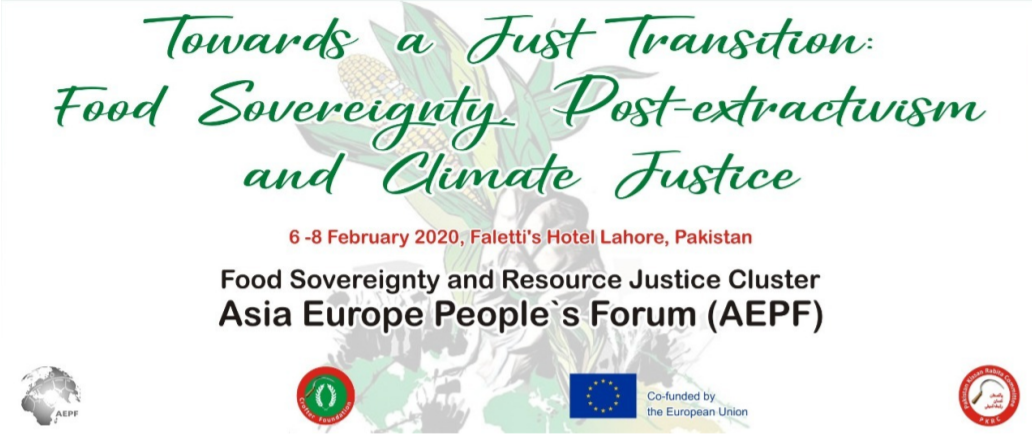Towards a Just Transition: Food Sovereignty Post-extractivism & Climate Justice

PLENARY SESSIONS AND WORKSHOPS
CONCEPT NOTES
1. Roundtable: ‘Towards a just transition: Struggles for food sovereignty, post-extractivism, and climate justice’
A global consensus exists on the need to transition to a post-fossil fuel future in light of the overwhelming evidence of human-induced climate change manifest in global warming, extreme weather events, catastrophic biodiversity loss, and natural resource degradation. The term just transition is often used to describe what this transition should be, but it can mean different things to different people. There can be no just transition that is not based on the principles of food sovereignty, economic democracy, and post-extractivism. Across the world, peasants, pastoralists, fishers, indigenous peoples, agricultural and food system workers, trade unionists and labour activists are leading the way, showing how a just transition can be put into practice. Many of these groups are mobilising in the form of national and transnational social movements in a call for systemic change.
Objectives:
1. To unpack the concept of a just transition and what this means for agriculture, food systems, and natural resource use
2. To hear from diverse experiences on the ground on how strategies for a just transition are being pursued
3. To examine the challenges and opportunities in moving towards a just transition
4. To consider a number of policy proposals for how a just transition can be enabled and supported
Key input: Draft AEPF framing paper on just transition
2. Belt and Road Initiative (BRI): Understanding its implications for food sovereignty and rural resistance
Since the launch of the Belt and Road Initiative (BRI) in 2013, 136 countries and 30 international organizations have signed BRI cooperation documents, received US$90 billion in Chinese Foreign Direct Investment (FDI) and exchanged US$6 trillion in trade with China. President Xi Jinping has described the BRI as the ‘Project of the Century’, yet the motivations, aims and scope of the BRI have been continuously debated and the Chinese Government has struggled to put forward a clear narrative for the initiative. At the same time, social movements, affected communities and civil society organisations across the globe have criticized BRI projects for harmful environmental, social and economic impacts, and resisted their implementation. In 2018 at AEPF12 in Ghent, Belgium, the AEPF began analysing the BRI and sharing experiences relating to the BRI, continuing with a workshop in Amsterdam in June 2019. A framing paper to guide future AEPF work in relation to the BRI was published in November 2019.
Objectives:
- Deepen collective analysis of BRI, with its impacts on food sovereignty and natural resources;
2. Discuss resistance strategies and alternatives to Chinese outbound investments and BRI projects in particular;
3. Agree on concrete proposals for parliamentarians in ASEM and a strategy to strengthen alliances between Europe and Asia on the BRI.
Key input: AEPF framing paper on the BRI
3. Agroecology and climate justice: Pathways for transforming food systems
For peasants, agroecology is the way in which we practice our way of life and produce an abundance of healthy and affordable food for all of humanity. Agroecological solutions are not delivered top down. They are developed by peasants, building on peoples’ local knowledges. As the creators of peasant agriculture, and as an expression of our ancestrality, agroecological peasant agriculture is a common element in our diverse cosmovisions, and element that has been created through a dynamic historical process involving cultural encounters among endogenous processes of ‘dialogue of knowledges’.
Contrary to what its detractors often claim, agroecology has been spread and applied by many farming communities worldwide. The challenge remains how to bring agroecology to scale supported by enabling policy and governance frameworks so that it is practiced by even more families over larger territories. Scaling combines vertical (scaling up) and horizontal (scaling out) processes.
The transition to agroecology will entail a real transformation, not only of farming practices, but also in terms of markets, policies, land and other natural sources. The transition to agroecology entails the process of a real societal transformation towards a society based on the concept of Food Sovereignty as stated in the 2015 Declaration of the International Forum on Agroecology.
The claim for food sovereignty means claiming the autonomy and the self-organization of people and the direct and democratic control by people over policies and natural resources, especially over core elements such as food and agriculture policies. In this sense the concept of agroecology – being more than a mere economic model but a way of life – supports this transformation towards a society based on local knowledge, promoting social justice, nurturing identity and culture, and strengthening the economic viability of rural areas.
By advocating for agroecology the current power structure will be challenged by putting forward a model of cooperation and solidarity between people rather than individualism, competition and economic profit, and claiming control of resources by communities based on a fair peasant economy rather than by the private sector.
The work on agroecology globally will strengthen peasant agroecology and seed diverse activities region-wide by linking existing initiatives, by networking between peasant organisations and networks and by facilitating horizontal farmer-to-farmer learning processes. This would also substantially increase farmers’ voices and participation in regional and international debates and policy fora resulting in policy environments that favour peasant agroecology. Through those, we would challenge the industrial food chain by documenting its
inefficiencies, lack of diversity, and incapacity to address the climate crisis and food insecurity, and by showing how the corporate controlled food system undermines agroecology and biodiversity.
While the industrial food system is one of the main drivers of global heating, peasant agroecology and food sovereignty offer huge potentials for reducing emissions – including by keeping fossil fuels underground, adapting to climatic changes and realizing social justice. Peasant agroecology and food sovereignty are social, political, and ecological visions that unite multiple sectors within a single movement to challenge business-as-usual and create systems of shared control over the requirements of life.
Objectives
In this workshop, we would like to focus on the challenges we are facing today globally:
- Given the bottom-up approaches that agroecology implies, there is currently a disconnected structure for using, sharing and building upon resources already available. The spread of agroecology requires inclusive, community-oriented methods for peasant-to-peasant networks, horizontal training and pedagogies.
- There is an aggressive promotion of high-tech and other technological approaches by the agribusiness sector, supported by media and policies. The challenge is to change the discourse and prove the validity and innovations of peasant-led agroecology, and debunk the myth that agribusiness is innovative, efficient and successful for sustainable and fair food systems.
- Industrialized agriculture and the corporate food system are at the center of the climate crisis. Yet, rather than taking immediate and far-reaching action to make fundamental change, governments and corporations promote carbon markets, geoengineering and technological fixes they say are «triple wins» for sustainability, development and equity. We have to challenge the perceived superiority of this industrial model.
- There is a lack of political action to address the non-sustainability of industrial farming models and a lack of policies allowing peasants’ access to natural resources and commons. There is a need to enhance the recognition among key decision makers of agroecology and its
benefits, and to establish supportive policies.
4. Implementation strategies for the Declaration on the Rights of Peasants
In December 2018, the 73rd Session of the United Nations (UN) General Assembly in New York adopted the UN Declaration on the Rights of Peasants and Other People Working in Rural Areas (UNDROP). Following this, the declaration is an official voluntary international legal instrument. The UNDROP is a declaration that touches transversally on many different issues concerning peasants. In that sense the UNDROP can be used to strengthen peoples movements (peasants and other people working in rural areas) demands in different fields (seeds, land, fair prices, etc.) and at different levels (local,national, European, Asian and international). The adoption of the UNDROP is the result of almost 20 years of mobilisation by La Via Campesina and its allies, and of 6 years of negotiation at the UN Human Rights Council. It aims to respond to the multiple forms of discrimination faced by peasants and other people working in rural areas, who are the first victims of extreme poverty and hunger, and to protect and promote their rights and dignity.
The implementation of the UNDROP represents a unique opportunity to re-balance power relations in rural areas, and to guarantee that states will respect, protect and fulfil the rights of peasants and other people working in rural areas, who have too often been marginalised within international, regional and national laws and policies. The process of adoption ended and we are about to start the process of implementation which is different in many ways. The adoption process was fast and we have not got the time and resources to share and consult on every aspect of the work done neither at global level nor at regional level. The implementation process needs to be strongly rooted in a process that is inclusive, transparent, gender and regionally balanced.
Key input: Declaration on the Rights of Peasants and Other People Working in Rural Areas
5. Plenary discussion: Policy recommendations and way forward
The Asia Europe People’s Forum (AEPF) is an interregional network of progressive civil society organisations from across Asia and Europe. Since 1996, the AEPF has consistently been a network linking Asian and European NGOs and social movements. It is committed to fostering people’s solidarity for a socially and economically just, inclusive, peaceful, sustainable and ecologically sensitive development, within and across the two regions. The AEPF’s vision and practice are to advance people’s voices and visions within Asia-Europe relations.
In this plenary session, we would like to have an exchange on how we can strengthen the AEPF network and commons struggles for food sovereignty and natural resource justice throughout Asia and Europe. This can take into account the opportunity to convene again for another AEPF gathering scheduled to take place in the latter half of 2020 in Asia. It would build on the political manifesto agreed during the previous AEPF event held in Ghent, Belgium in October 2018.



